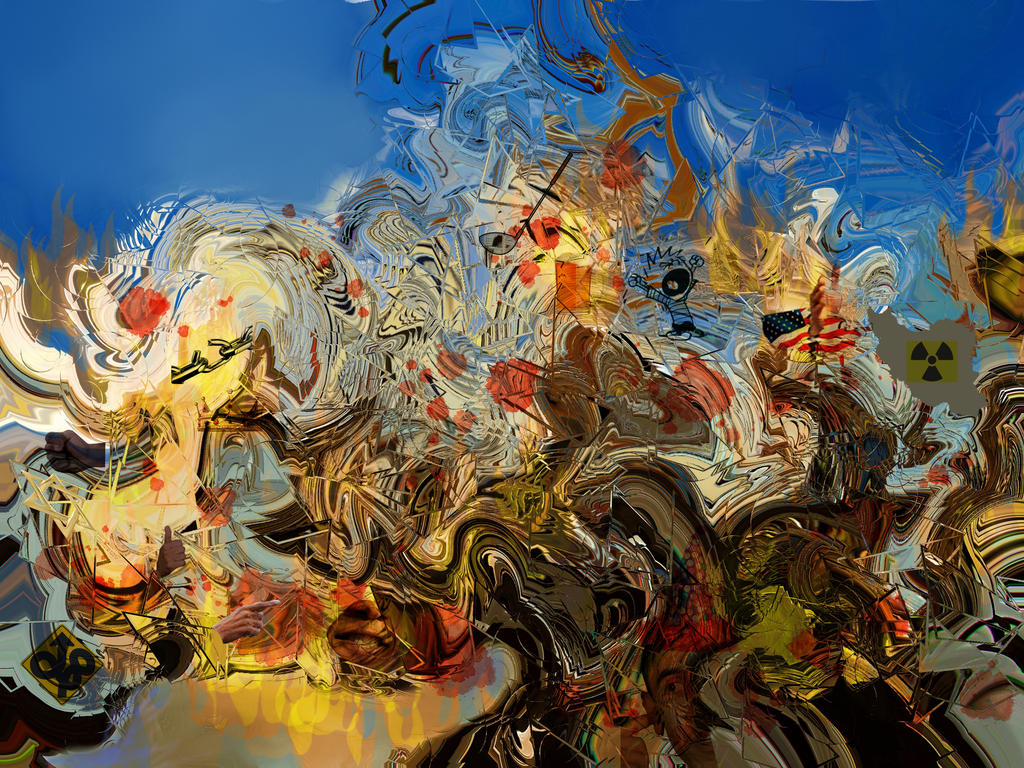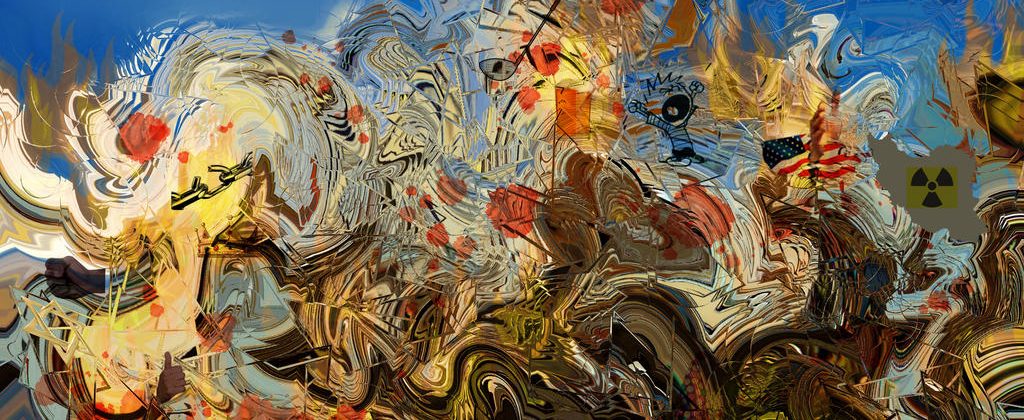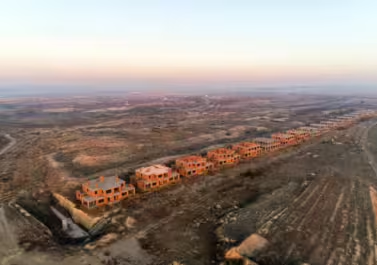
The following thoughts were presented at an international meeting in September 2023
Today we will discuss aspects of the current global situation, such as the war in Ukraine, the mobilisation against climate change and the block confrontation between the US and China. I start this introduction to the global moment by talking about the pandemic, primarily to encourage a certain methodological approach. Since the pandemic, it has become commonplace to state that we are in a situation of multiple crises in a multi-polar world – from climate change to economic decline to geopolitical tensions. It is fairly easy to criticise those who treat these issues as separate problems; for us the bigger challenge might be to resist the reflex to state that ‘it is all due to capitalism’. This reflex might prevent us from analysing each crisis in detail and from discovering their inner contradictions – first of all the contradiction between capitalism as a system of ‘valorisation of value’ (and/or of domination and oppression) on one side and as a mode of production of society on the other. Capitalism is not all about ‘making money’, it is a contradictory system in which we reproduce ourselves and society within the structural confines of ‘making money’.
These contradictions became most apparent during the pandemic. We were able to point out the relation between capitalist urbanity, large scale animal husbandry, industrial agriculture and global trade and transport as reasons for why the pandemic spread quickly. It was harder to explain the contradiction between the ‘general capitalist interest’ to contain the pandemic with the aim of sustained social reproduction and the difficulty of diverging nation states, various multinational pharma-corporations and public health services ailing under austerity and privatisation to do so. At this point it is not enough to say that ‘the capitalists just don’t give a shit’ or ‘the state is just interested in surveillance’, but we would have to analyse why the global capitalist system in its fragmented division of labour is struggling to develop a coordinated, scientific and effective response to its own problems. From this perspective the role of the working class – comprising health scientists, auxiliary nurses and working class ‘communities’ – changes from one of being a victim to one that has a social responsibility to solve social problems, as a ‘positive productive force’.
The problem is, of course, that ‘the working class’ doesn’t exist as such a conscious global subject and that it can only create itself through the struggle for its antagonistic interests, in a ‘negative destructive relation’ to the capitalist system. We can see that during the pandemic the potential process of political recomposition became clearer: after decades of neoliberal ideology that believed in the indistinguishable character of ‘economic activity’, society had to reckon with the fact that there is something like ‘essential labour’ and the conditions under which ‘essential labour’ is performed in warehouses, factories, hospitals, vegetable fields; during the initial weeks of the pandemic ‘health and safety’ at work relied on a concrete application of ‘workers’ control’; the division between productive tasks and the privilege of management to remove themselves into ‘home office’ became apparent; so did the mass proliferation of bull-shit jobs, which, under the risk of catching the virus, became even more unnecessary – this made obvious that “society survives even if only 30% of the workforce works” and the potentials for radical working time reduction through the socialisation of necessary labour; we saw the temporary replacement of ‘market forces’ and a semi-nationalisation of the labour market by a blanket state response in the form of subsidised company revenues and wages. This was followed by a severe class attack on working class conditions in the form of, amongst others, ‘fire-and-rehire’ or new ‘flexible’ working technologies, for example in education. In this moment the role of communists is to insist on the defensive class interest and at the same time to emphasise the potentials within the crisis that point beyond the existing mode of production. These reflections on the pandemic can perhaps serve as a general approach in the debate about the global crisis.
How can we start to summarise the current global moment and to analyse the interconnections between different aspects of the crisis?
The cycle of accumulation based on the automobile as its main carrier has entered into a deep crisis since the 1970s: through the squeeze on the valorisation of mass assembly line work, the failure of ‘freedom’ of individual mode of transport, the critique of its environmental impact, the decline of the US-dollar hegemony over the global oil industry. In the following decades we could see two main shifts within the productive base of capitalism in reaction to this crisis: the global relocation of manufacturing towards the global south; and investment into microelectronics (IT, automation) and allegedly ‘green’ technology and energy resources. With this shift we could also see two major changes in the financial structure of global capitalism: the development of so-called ‘Chimerica’, the intertwinement of US and Chinese investments and trade were reflected in a financial interdependence; and the development of various ‘bubbles’ attached to the investments into IT and tech industries. It would be relatively easy and correct to say that the global financial crisis in 2008 demonstrated that these two major shifts – the establishment of global production chains and investment in IT technology and micro-electronics – did not create a new and stable base for valorisation. At the same time we can see that these shifts have changed the world and the working class fundamentally, which means that our questions about the crisis are not answered by referring to its core reason. We have to look at the various technical and social expressions in order to find answers for the task of social transformation.
The decline of US hegemony and the return of protectionism
Since the 2008 crisis we see the return of economic protectionism in its various political forms, from Brexit to Trump to ‘21st century socialism’. On a global scale this ‘trade war’ is dominated by the US – China relation, which is very contradictory if we look at its various aspects. On a financial level the US has changed from the world’s major creditor to the world’s largest debtor – this process mirrored the productive investment into China and the increase in imports of Chinese manufactured goods. Given the global hegemony of the dollar and the importance of trade with the USA, the USA was able to finance its state debts by forcing other nations, first of all China, to park their surplus in US treasury bonds. With the global recession we see a kind of ‘pay back time’ moment, where major creditors like China want to be able to invest their money into global industries and/or US assets. The US tries to prevent this ‘organic flow of capital’ in various ways, from protectionist fiscal and trade policies to sanctions. In reaction to this we see more serious attempts to create alternative global currencies. We have to discuss if the US-dollar hegemony has been eroded to such an extent that a global financial policy like the ‘Volcker-Shock’ in the 1970s, which imposed a recession through a hike in interest rates in order to curb inflation and enforce structural adjustment programs, has become impossible.
On a productive level we can still see a major intertwinement between China and the US, and in that sense an immediate common interest in making profits, which puts limits on the financial trade war. We see how this common interest overrides the block competition in various forms, e.g. as continued business relations with Russia despite sanctions or as collaboration with Chinese subsidiaries for the construction of semi-conductor or battery plants in the UK. At the same time the material specificity of ‘future technologies’, e.g. the fact that there is a quantitative scarcity of rare earth elements, intensifies the competition. China is responsible for the production of about 90% of the world’s rare earth elements, at least 80% of all the stages of making solar panels and 60% of wind turbines and electric car batteries. Global sanctions in the name of ‘security’ is an attempt to curb this material dominance of Chinese manufacturing. With the waning productive power of the US, the military dominance becomes increasingly significant for the defence of global hegemony and the prevention that ‘debts have to be repaid’. On a military level the ‘new global world order’ of the 1990s ended in failures, which limits the appetite of the major blocks to get directly involved. This expresses itself in proxy wars such as in Ukraine and potentially Taiwan and in the ‘scramble for Africa’, when it comes to access to natural resources. We can see that recycled concepts like neo-colonialism are of little use when it comes to understanding the current situation. More recent attempts like ‘Empire’ failed to envisage the return of major block confrontations that we witness today.
The crisis of global production chains
The relocation of production and the development of global supply-chains as one of the main ‘fixes’ has reached certain limits, which became apparent shortly after the pandemic: the increase in wages in China, also due to a demographic crisis, in combination with increasing transport costs have minimised profit margins through relocation to lower wage countries. The global imbalance between location of production and consumption and the increased intertwinement of the logistics sector with financial speculation also resulted in a technical mismatch between various links of the chain: too big ships for underdeveloped ports, oversupply in containers in some regions and lack in others, lengthening of traffic jams for road transport due to under-investments into rail roads etc. We also see how the block confrontation and national competition makes smooth transport operations harder, e.g. if we think about the stumbling blocks for the new Chinese silk road project or the long traffic jams at UK ports due to Brexit. In transport, like in other large-scale infrastructure projects, we can see that subcontracting and ‘de-industrialisation’ in the countries of the global north have created situations of skill scarcity and disorganisation, e.g. in the UK, the state is unable to finish projects like the high-speed train HS2 and the completion of Berlin airport took ages. We also shouldn’t underestimate the impact of various transport and logistics workers’ struggles on a world scale, which adds further risk factors to long-distance commodity transport. Last, but not least, capitalist climate change starts to bite its tail, e.g. in the form of water scarcity that threatens the cargo traffic in the Suez canal or the impact of ‘natural disasters’ on global transport.
The crisis of the tech and ‘green’ industry
During the boom after World War II, capitalism had more to offer to the global working class than just a ‘spiral to the bottom’, primarily in the form of the automobile as ‘freedom’ and the green agricultural revolution as ‘bread’. The promise of the electronics industrial revolution was that of a ‘light’ and green world, where polluting chimneys and hard labour is replaced by global communication and information exchange. We can perhaps say that this promise, symbolised in the internet, has actually raised the aspirations of the global working class and proliferated the means to spread them – my personal example is that of a young Suzuki worker in India who came out of a week-long factory occupation and followed Occupy Wall Street on his mobile phone, proposing that the two occupations should work together. These aspirations attached to new technologies are not just illusions and we have to bear them in mind as potentials when looking at the impact that these technologies have within the sphere of production and society at large.
This cycle of accumulation hasn’t created large-scale industrial employment like the automobile industry – it is rather characterised by very few better paid tech jobs, relatively few industrial jobs of 12-hour shifts at Foxconn or Taiwanese semiconductor factories and millions of platform-based and badly paid service jobs of underemployment. Within the sphere of production, ‘IT and microelectronics’ are rather used as means of accounting and surveillance than of actually revolutionising the way productive work is performed. Historically low levels of productive investments are questioning the threat of robots or artificial intelligence for employment. The myth that IT is a green technology has also been busted, looking at the water and energy consumption of data farms or semi conductor and battery production. The ‘green transition’ is symbolised by state-subsidised electrical SUVs of limited use value, whose production depends on rare earth mining in Africa, protected by various outsourced global mercenary troops. Given its limited industrial and productive base the era of the ‘new industries’ is even more prone to monopolistic tendencies and ‘inequality’ – which expresses itself in widespread social critique of people like Bezos or Zuckerberg. The cracks have begun to show in the form of Google or Amazon tech workers criticising the use of their product and the spreading of strikes in the electronics and logistics sectors. We can also see an increasing awareness, fostered by struggles like at GKN, that a green transformation has to come from below and that the possible socialisation of production can be aided by the new means of coordination and accounting that IT provides.
The crisis of democracy and state mediation
The contradiction between the increase of ‘global problems’ (climate change, pandemics) and global means of communication and knowledge on one side and the increase in national competition and inability of the political class to create a coordinated response to these problems is visibly sharpening. The bourgeois ideal of the state as the ‘representative of general interest’ is undermined by global fractures and an internal corruption of politics through years of neoliberal decay (“There is no society”).
Despite the fact that global capitalism now possesses advanced means to calculate its economic problems and to offer increased ‘democratic’ participation (or ideological manipulation) to the working class, the outcome of the crisis is astonishingly traditional: recession leads to a return of populism and nationalism; modern financial tricks like quantitative easing still results in inflation; inflation still triggers a return of strikes and a widespread disengagement from official politics. Perhaps it is an equally traditional thought, but it seems that in this situation the role of the global working class is to defend and represent the ideal of a ‘general interest’ and to impose itself as a political power that can develop and socialise the forces of production against the inability of state and capital to do so.



